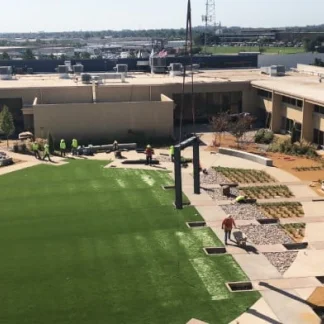Oklahoma Heart Institute
Oklahoma Heart Institute is a private rehab located in Tulsa, Oklahoma. Oklahoma...
12 & 12, located in Tulsa, Oklahoma, is a comprehensive community drug rehab center for men and women. They offer a wide continuum of care that expands from detox to aftercare. No one is turned away due to lack of financial means.
12 & 12 offers medically assisted detox, residential treatment, intensive outpatient, medication assisted treatment, transitional living housing, and aftercare services.
For those at high risk during withdrawal, 12 & 12 provides medically assisted detoxication services. During the 4 – 7 day stay, registered nurses will medically monitor the process with primary care oversight by an addiction certified physician.
The Intensive Residential program is overseen by a licensed counselor or supervised primary counselor. It includes dedicated treatment for 25 – 37 hours each week. During this time, individual, group, and educational counseling will be implemented. Common themes include anger management, grief recovery, self esteem enhancement, coping skills acquisition, stress management skills, interpersonal relationship building skills, gender specific issues, and relapse prevention. The total length of stay averages 30 – 45 days.
The Intensive Outpatient program is a step down from residential treatment and can also be participated in by those who underwent detoxification but who do not need residential treatment. The average length of this program is 6 – 7 weeks, which includes about 20-24 three-hour counseling sessions. Day and evening sessions are available.
The Transitional Living program provides the opportunity to live with other people in recovery while slowly integrating back into normal living. This program is only available to those who have successfully completed higher needs addiction treatment successfully and who are ready to step into a lower level of care. Continued outpatient counseling is required for the typical stay of 2 – 3 months. School or work must also be attended.
Upon completion of any 12 & 12 recovery program, aftercare services are provided.
Contact us for more information: (918) 664-4224

Connect with 12 and 12 by calling their admissions team directly.
(918) 664-4224 Website Get DirectionsThe Commission on Accreditation of Rehabilitation Facilities (CARF) is a non-profit organization that specifically accredits rehab organizations. Founded in 1966, CARF's, mission is to help service providers like rehab facilities maintain high standards of care.
CARF Accreditation: Yes
Family involvement is an integral part of the treatment and recovery process at 12&12. Addiction is a chronic, progressive illness and it affects not only the afflicted person, but also his or her spouse, partner, family members or concerned friends. At 12&12, they believe recovery is a family process.
Group therapy is any therapeutic work that happens in a group (not one-on-one). There are a number of different group therapy modalities, including support groups, experiential therapy, psycho-education, and more. Group therapy involves treatment as well as processing interaction between group members.
In individual therapy, a patient meets one-on-one with a trained psychologist or counselor. Therapy is a pivotal part of effective substance abuse treatment, as it often covers root causes of addiction, including challenges faced by the patient in their social, family, and work/school life.
Life skills trainings involve all the skills a person must have in order to function successfully in the world. These include time management, career guidance, money management, and effective communication. Truly successful addiction recovery is based on the ability to not only live substance-free, but to thrive. Life skills teaches the practical necessities of functioning in society, which sets clients up for success in life, and therefore sobriety.
Group therapy is any therapeutic work that happens in a group (not one-on-one). There are a number of different group therapy modalities, including support groups, experiential therapy, psycho-education, and more. Group therapy involves treatment as well as processing interaction between group members.
In individual therapy, a patient meets one-on-one with a trained psychologist or counselor. Therapy is a pivotal part of effective substance abuse treatment, as it often covers root causes of addiction, including challenges faced by the patient in their social, family, and work/school life.
Life skills trainings involve all the skills a person must have in order to function successfully in the world. These include time management, career guidance, money management, and effective communication. Truly successful addiction recovery is based on the ability to not only live substance-free, but to thrive. Life skills teaches the practical necessities of functioning in society, which sets clients up for success in life, and therefore sobriety.
In individual therapy, a patient meets one-on-one with a trained psychologist or counselor. Therapy is a pivotal part of effective substance abuse treatment, as it often covers root causes of addiction, including challenges faced by the patient in their social, family, and work/school life.
Life skills trainings involve all the skills a person must have in order to function successfully in the world. These include time management, career guidance, money management, and effective communication. Truly successful addiction recovery is based on the ability to not only live substance-free, but to thrive. Life skills teaches the practical necessities of functioning in society, which sets clients up for success in life, and therefore sobriety.
Life skills trainings involve all the skills a person must have in order to function successfully in the world. These include time management, career guidance, money management, and effective communication. Truly successful addiction recovery is based on the ability to not only live substance-free, but to thrive. Life skills teaches the practical necessities of functioning in society, which sets clients up for success in life, and therefore sobriety.
Oklahoma Heart Institute is a private rehab located in Tulsa, Oklahoma. Oklahoma...
We provide behavioral health and mental health counseling services, including in...
H.o.w. Foundation Of Tulsa is a public rehab located in Tulsa, Oklahoma. H.o.w. ...
Bearden Stan is a private rehab located in Tulsa, Oklahoma. Bearden Stan special...